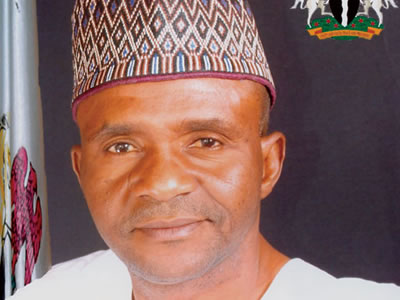Indications are rife that Taraba State Governor, Mr. Danbaba Suntai may dissolve the state executive committee “any moment”,
The move may be the anti-climax of a protracted power tussle between Suntai and his deputy, Alhaji Garba Umar.
Before Suntai’s return to Nigeria on Sunday, after a 10-month absence in Germany and America, Pointblanknews.com gathered, Umar had perfected moves to effectively take over the reins of power as governor.
Umar had during Suntai’s absence allegedly orchestrated the sacking of principal officers of the state legislature. He had followed up in July by sacking 11 top appointees of his boss.
The governor’s return, Pointblanknews.com gathered, has already sent jitters down the spines of the state legislators, and not wanting to lose out politically, have begun serious political realignments.
Suntai, who underwent series of medical treatment abroad as a result of head and limb injuries sustained when his aircraft crashed last October, on Monday formally notified the Assembly Speaker, Hon. Haruna Tsokwa, of his return.
Suntai’s sudden return and letter to the Speaker, Pointblanknews.com gathered, have greatly unsettled the Umar camp.
Legal experts told Pointblanknews.com that, by transmitting a letter notifying Speaker Tsokwa of his return, Suntai has fulfilled the provisions of Section 190 (2) of the Nigerian Constitution as amended.
“Section 190 (2) makes it mandatory for a governor who has returned from a leave he or she embarked on with or without the knowledge of the Assembly, to transmit a letter to the Speaker that he or she is back.
“By the provision of that section, the governor on AWOL assumes full powers the moment such letter is transmitted, even if by email,” a Senior Advocate of Nigeria (SAN) submitted.
The senior lawyer scoffed at reports that the Assembly may sit to consider Suntai’s letter.
“Consider what? There is nothing to consider. The governor has played his part by transmitting a letter to the Speaker. Whatever the Speaker does with the letter is none of anybody’s business. The Assembly, I believe, should have members who are lawyers. They should know better,” he added.
On claims by Umar that he remains Acting Governor until the Assembly considers Suntai’s letter, the lawyer dismissed it as “idle talk.”
He stressed, “I don’t want to believe deputy governor said that. It’ll be sad if he actually said that because you cannot have a governor and an acting governor at the same time. As far as the law is concerned, until Suntai is removed from office, he remains the governor and Umar, his deputy.”
In late April, the state Assembly sacked its principal officers who were primarily considered Suntai’s loyalists. Prominent politicians blamed the change of guard in the Assembly on Umar.
Hardly had the dust on the Assembly palace coup settled than the then acting governor, on July 9, sacked 10 principal appointees of Suntai, including the Secretary to the State Government (SSG) Ambassador Emmanuel Njiwah.
While Umar said the sack of the SSG, six commissioners and four advisers was in compliance with the recommendations of the Assembly, some argued that it was political vendetta since all the affected officials were considered Suntai’s legmen.
Umar was nominated by Suntai to become deputy governor after the Assembly impeached the former, Sani Abubakar.
Suntai’s plane crashed three weeks after Umar’s swearing-in as deputy governor. Three weeks after the air accident, Umar was made acting governor by the state legislators.
The sack of the House leadership and top appointees of Suntai, some argue, were acts of desperation by Umar to supplant Suntai as governor.



